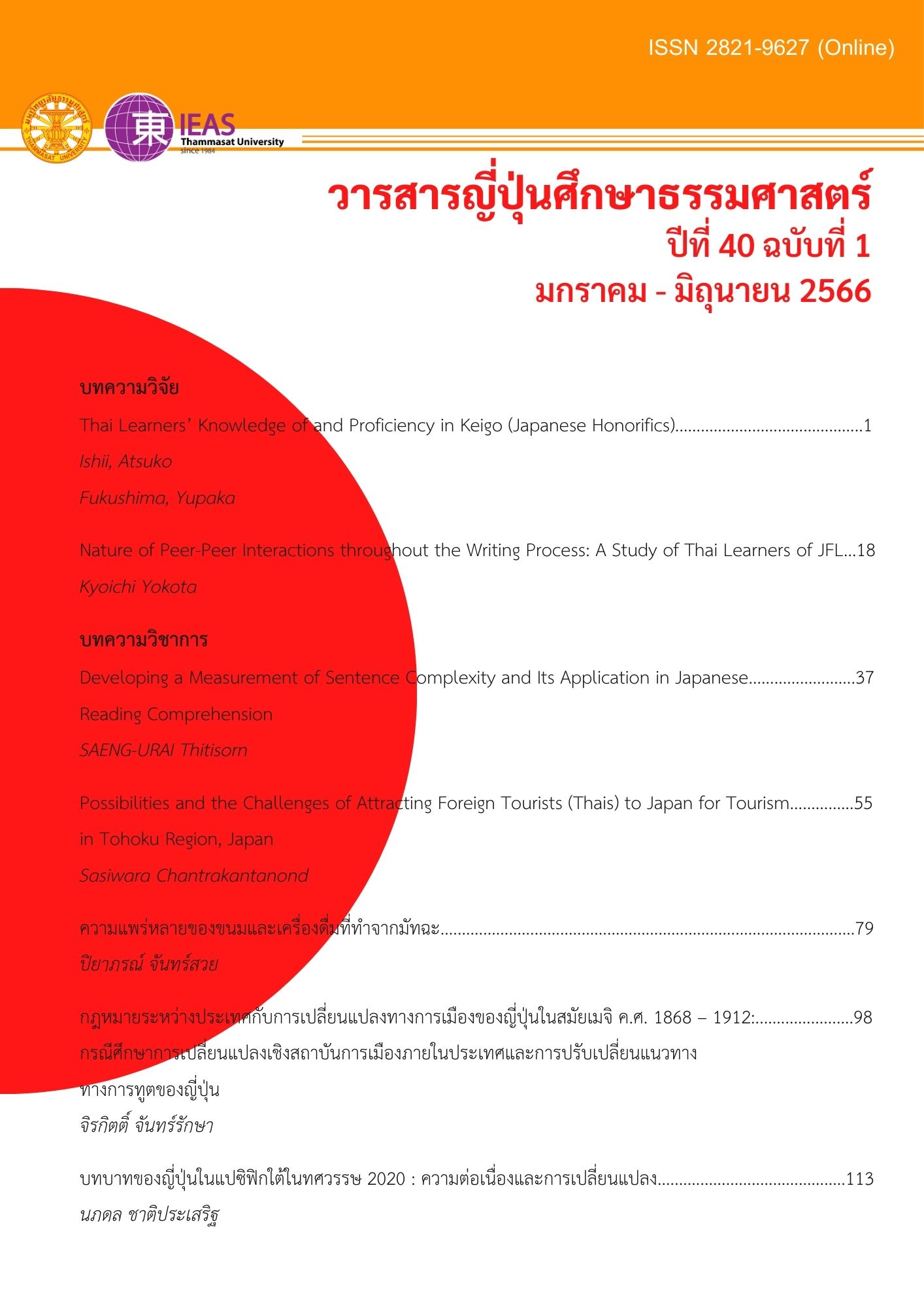Nature of Peer-Peer Interactions throughout the Writing Process: A Study of Thai Learners of JFL
Keywords:
collaborative writing, collaborative learning, peer-peer interaction, pair work, JFLAbstract
This study sets out to investigate the nature of peer-peer interactions during the entire writing process in a Japanese as a foreign language (JFL) setting and makes a proposal for Japanese writing education at higher educational institutions outside Japan. Twelve university learners of Japanese in Thailand were instructed to write a script for an oral presentation in pairs as part of their classroom activities. They interacted with each other only in Japanese throughout the writing process, consisting of the planning, writing and revision phases, and all pair interactions were either audio- or video-recorded. The analysis of the interactions indicated that collaboration particularly afforded the learners opportunities to generate ideas and solve linguistic problems that they encountered throughout the writing process. Furthermore, the analysis of language-related episodes from the interactions showed that the learners most frequently focused their attention on grammatical problems with discussions about problems related to the reading of Kanji and transliteration of foreign words into Katakana as well as lexical problems. The analysis also revealed that the learners correctly solved most of the linguistic problems while adopting a collaborative approach throughout the writing process. The findings suggested the active implementation of collaborative writing between peers in the target language in a JFL setting henceforth.
Downloads
References
Donato, R. (1994). Collective scaffolding in second language learning. In J.P. Lantolf & G. Appel (Eds.), Vygotskian Approaches to Second Language Research (pp. 33-56). Ablex.
Fernández, D. A. (2012). Collaborative writing tasks in the L2 classroom: Comparing group, pair, and individual work. Journal of Second Language Writing, 21, 40-58.
McDonough, K. (2004). Learner-learner interaction during pair and small group activities in a Thai EFL context. System, 32, 207-224.
Sanprasert, N. (2010). The application of a course management system to enhance autonomy in learning English as a foreign language. System, 38, 109-123.
Storch, N. (2002). Patterns of interaction in ESL pair work. Language Learning, 52(1), 119-158.
Storch, N. (2005). Collaborative writing: Product, process, and students’ reflections. Journal of Second Language Writing, 14, 153-173.
Swain, M. (2000). The output hypothesis and beyond: Mediating acquisition through collaborative dialogue. In J.P. Lantolf (Ed.), Sociocultural Theory and Second Language Learning (pp. 97-114). Oxford University Press.
Swain, M. (2006). Languaging, agency and collaboration in advanced second language proficiency. In H. Byrnes (Ed.), Advanced Language Learning: The Contribution of Halliday and Vygotsky (pp. 95-108). Continuum.
Swain, M. & Lapkin, S. (1998). Interaction and second language learning: Two adolescent French immersion students working together. The Modern Language Journal, 82, 320-337.
Watanabe, Y. & Swain, M. (2007). Effects of proficiency differences and patterns of pair interaction on second language learning: Collaborative dialogue between adult ESL learners. Language Teaching Research, 11(2), 121-142.
王文賢. (2014). 「中国人学習者の協働学習活動に対する意識-ディクトグロスを経験した学習者を対象 に-」. 『日本言語文化研究会論集』, 10, 31-49.
鹿目葉子. (2014). 「中上級学習者のスピーチの上達に向けた授業とは-ピア・レスポンスと評価活動を授業に取り入れた試みから-」. 『国際交流基金バンコク日本文化センター日本語教育紀要』, 11, 51-60.
鹿目葉子・横田恭一・石崎大地・篠原映美・成田ゆに・西田菜摘. (2015). 「タイの高等教育機関におけるC大学のSENDプログラムの役割とは-K大学での日本語指導・指導支援・交流活動の実践から-」. 『国際交流基金バンコク日本文化センター日本語教育紀要』, 12, 67-76.
陣内正敬. (2008). 「日本語学習者のカタカナ語意識とカタカナ語教育」. 『言語と文化』, 11, 47-60.
横田恭一・鹿目葉子. (2017). 「日タイ大学生による短期交流活動の意義と今後の在り方-タイにおける日本語学習者と教師の視点-」. 『Japanese Studies Journal』, 34(2), 1-15. https://so02.tci-thaijo.org/index.php/japanese/article/view/164508/119264
横田恭一・鹿目葉子・清水慶子. (2021). 「ライティング活動における協働学習に対する学習者の意識-タイの大学で学ぶ日本語学習者を対象とした調査から-」. 『Japanese Studies Journal』, 38(1), 131-146. https://so02.tci-thaijo.org/index.php/japanese/article/view/248740/168671
Downloads
Published
Issue
Section
License
Copyright (c) 2023 Thammasat Journal of Japanese Studies

This work is licensed under a Creative Commons Attribution-NonCommercial-NoDerivatives 4.0 International License.




